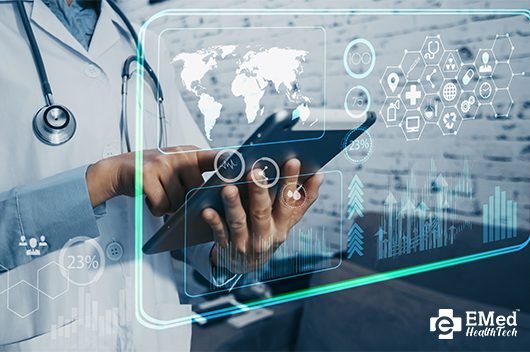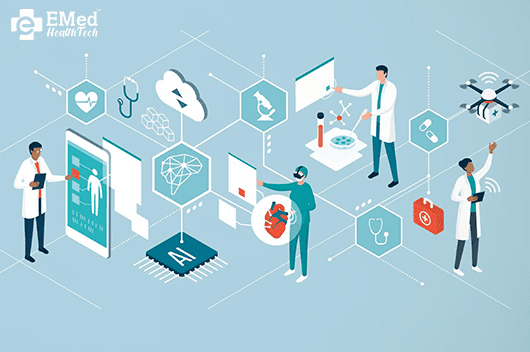Healthcare is one of the most important factors in any country’s economy whether it is a developing or developed country. During this global pandemic, digital healthcare services are growing exponentially. The world has more healthcare opportunities to fight against the healthcare crisis. At that time the developing countries are at a compelling disadvantage in responding to the crisis. Therefore either in the healthcare or economy, the developing countries are likely to be hit the most by the pandemic.
eHealth – A Major Challenge For Developing Countries:
Though there are defined and recorded benefits of eHealthcare, the adoption of digital health specifically in developing countries still remains a major challenge. Healthcare systems in developing countries often struggle to provide economical, high-quality, and globally accessible healthcare. The low- and middle-income countries are facing the challenges such as high population, economic resources limitation, volatile national capabilities, limited internet bandwidth, and poor medical infrastructure, etc.
Due to certain challenges, the developing countries are unable to obtain basic health care requirements and accomplish their health goals. If the known healthcare challenges of the developing countries are not settled by time, it can affect the whole world.
4 Main Areas To Be Focused To Overcome the Challenges:
Healthcare Digital solutions have proven to be valuable assets to highlight the key challenges, specifically by implementing technology and enabling better communication within & among various parts of the healthcare chain. Developing countries can focus on the below-mentioned 4 areas to overcome the above-mentioned challenges in implementing digital health. With this they can have a better scope in advancing healthcare:
- Digitize Healthcare Information
- Improve the flow of Diagnosis and Treatment
- Better Delivery of eHealthcare Services
- Technology-enabled Healthcare Solutions
There is a need to invest in realistic efforts to overcome the major obstacles that developing countries have dealt with earlier and Today as well in adopting and accessing and implementing digital healthcare technologies.
Future of Digital Healthcare In Developing Countries:
Information and communication technologies are increasingly offering the tools and knowledge to improve health care, enabling health solutions that benefit patients as well as health professionals and institutions in both the private and public sectors globally. E-health can be used as the main source for the digital transformation of health conditions in the developing world, especially for those who are living in rural and remote areas.
Parallelly increased consumer demand for health services forces the health admins to adopt innovative tech solutions. Healthcare solutions need to integrate with information & communication technologies and digitize healthcare service distribution to initiate an e-health solution in developing countries.
The actual purpose to help developing countries and increase their health care outcomes means to explore healthcare technology, which experienced a rejuvenation during the pandemic.
In fact, the healthcare market growth of the overall world will be supported by swiftly expanding healthcare IT infrastructure in developed as well as in developing countries.
How Digital Health can Help Developing Countries?
A digital healthcare system can only be successful in a developing country if it is able to fulfill the requirements of different healthcare stakeholders. Countries should adopt the patient-centric approach. It is necessary for the healthcare organizations to serve and satisfy the patients first and then other healthcare entities as well such as doctors, physicians, researchers, clinics, hospitals, healthcare insurance, healthcare institutes, and government organizations.
Healthcare digital transformation with advanced technology will help to enhance the speciality of healthcare. Here are the technologies which can play a vital role in the growth of developing countries:
- IoT – Internet of things
- Virtual Healthcare
- RPM – Remote Patient Monitoring
- AI – Artificial Intelligence
- Big Data Analytics
- Blockchain
- Smart Wearables
- 5G
- AR – Augmented Reality
- VR – Virtual Reality
- The Cloud
- The Chatbots
- Healthcare Robotics
- Healthcare Analytics
- mHealth
On 19th Oct 2021, UNCTAD awarded investment promotion agencies (IPAs) from Costa Rica, the Netherlands, and the Republic of Korea for excellence in promoting investment in digital health sectors, such as manufacturing of medical devices, pharmaceuticals, and vaccines, in the production of personal protective equipment and more.
Here are examples of digital healthcare solutions that are strengthening health systems across developing countries:
1. Healthcare applications will be used to provide remote patient monitoring. Healthcare custom apps allow healthcare professionals to overcome the limitations of face-to-face follow-ups and make the most from the healthcare practices. Here are the examples of Healthcare apps that can be used to advance the healthcare system in developing countries:
- Telemedicine
- Online Pharmacy App
- Medical Reference & Database Apps
- Healthcare Networking Apps
- EHR & EMR App
- Doctor App
- Medicine Delivery App
- Telehealth Mobile Apps
- Health Apps For Patients
2. Healthcare softwares increase patient outcomes, enable virtual healthcare and automate healthcare workflows. Here are the examples of Healthcare software that can be used to implement digital healthcare in developing areas of the world:
- Telehealth Software
- IoT Healthcare Software
- PMS – Practice Management Software
- HMS – Hospital Management Software
- LIMS – Lab Information Management Software
- e-Pharmacy Software
- Medical Billing Software
3. Healthcare IoT will allow the healthcare system to be personalized for the patients and doctors. IoT implementation makes it possible to collect and track user data and to offer real-time monitoring.
Wrap it up…
The Healthcare industry in developing countries is experiencing a drastic revolution due to the digital transformation. Digital health has also become the crucial factor for health organizations to move away from their traditional health model to a more customized, cost-effective, and patient-focused united health service model. To move forward from developing country to developed country, the adoption of digital health is one of the most required factors. They need to acquire the approach of eHealth and need to implement digital transformation in healthcare to be a more advanced healthcare sector.
We at EMed HealthTech help healthcare startups, small and mid-level businesses as well as enterprises to develop customized Healthcare applications such as doctor applications, hospital apps, medicine delivery apps, and software by leveraging the latest technology. Our custom health solutions are the best fit for all of the healthcare stakeholders such as doctors, patients, pharmacists, clinics, laboratories, and hospital admins.
We also help healthcare professionals and health organizations to grow their online presence and business through various healthcare digital marketing services such as SEO, PPC, Social media, and more. Kindly request a free quote at info@emedhalthtech.com for your custom requirement for digital health.










